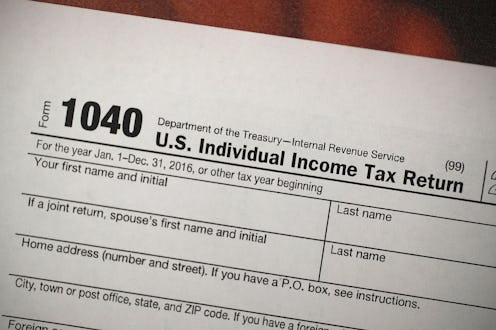News
Here's How The Government Shutdown Could Affect Your Tax Refund

In their 1976 hit Take The Money and Run the Steve Miller Band sings about Billy Joe and Bobbie Sue, two young lovers who, you guessed it, take the money and run. In a government shutdown, however, it's not young lovers who make off with the cash — it's the Internal Revenue Service (IRS). And it's not the money they take, it's yours. With limited staff and no spending deal in sight, a prolonged partial government shutdown could affect tax refunds as the IRS will still take money, but not be quick to issue it.
Funding for several major federal agencies lapsed at midnight on Dec. 22 after Trump and Congress failed to agree on a spending bill designed to keep the government open. As the shutdown moves into its 16th day Sunday, they appear no closer to a deal that would see agencies like the Treasury Department, which serves as the IRS' parent agency, fully funded and reopened.
Unfortunately for us all, a government shutdown doesn't excuse you from filing or paying your taxes — even if there isn't a lot of staff on hand at the IRS to process your return. Currently, the IRS is operating under a non-filing season lapsed appropriations contingency plan that sees roughly 12 percent of the agency's total employee population working through the shutdown.
It's unclear if, or how much more of, the agency's staff will be put back to work when the IRS begins accepting 2018 tax filings. However, according to CNN, the IRS plans to switch to a filing-season lapsed appropriations contingency plan sometime later this week in preparation for the coming tax season.
Last year, the tax filing season began on Jan. 29, and by the end of that first week, more than 18 million people had already filed their returns, according to data provided by the IRS. But this year, refunds could be delayed as CNN has reported that the IRS doesn't typically cut checks for refunds or perform audits during shutdowns. Those with questions may also find it harder than normal to get answers as the agency operates on reduced staff.
Further complicating matters is the fact that this season would be the first time taxpayers filed under the Tax Cuts and Jobs Act, which the IRS has described as "the largest overhaul of the Tax Code since 1986." It curbed many itemized deductions (such as limiting the amount of state and local taxes that can be deducted) while raising the standard deduction for singles to $12,000 and to $24,000 for married couples that file jointly. This tax season is also the first in which taxpayers will use a bevy of new forms, including the redesigned Form 1040.
These new changes are likely to leave at least some taxpayers with questions. But according to the IRS' non-filing season lapsed appropriations contingency plan, taxpayer services such as responding to taxpayer questions is not considered to be a non-excepted activity during the shutdown.
Of course, it's unclear if we'll still be locked in a partial government shutdown when tax filing season officially opens in late January or early February. On Saturday, House Speaker Nancy Pelosi announced that Democrats in the House aimed to begin passing individual appropriation bills designed to re-open government agencies one at a time — beginning with the Treasury Department and the IRS. If passed by the House, those appropriations measures would also need to be passed by the Senate.